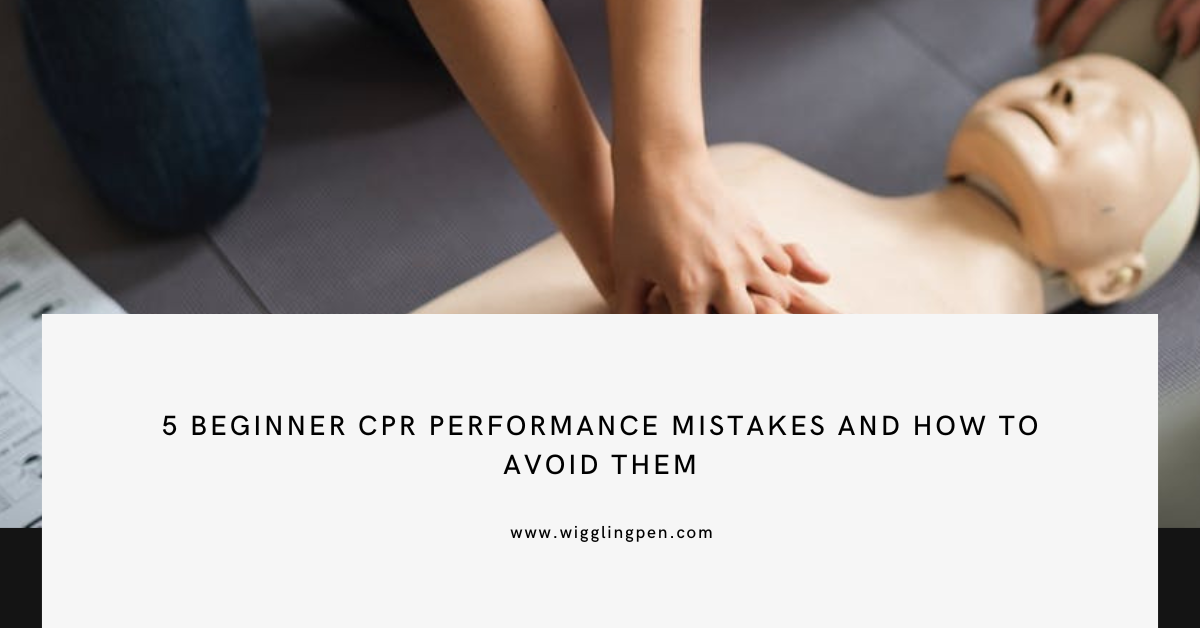
According to the American Heart Association (AHA), out-of-hospital cardiac arrest causes the deaths of close to 350,000 Americans annually, making it a significant public health issue. Only around 10% of persons who experience these emergencies survive. Perhaps the most important thing you can do is to make sure you are free from beginner CPR performance mistakes to help during a medical crisis.
Learning CPR is a life-saving technique used in emergencies to revive a person who has stopped breathing or whose heart has stopped. It is a simple yet effective way to maintain blood flow and oxygenation until medical help arrives. However, as a beginner, performing CPR can be overwhelming, and it’s easy to make mistakes that could affect the outcome.
Read on the five CPR performance mistakes and learn how to become a better lifesaver today.
1. Delaying CPR
When someone collapses or becomes unresponsive, time is of the essence. Every minute that passes without CPR reduces the chances of survival. Delaying CPR to call 911 or looking for an AED (automated external defibrillator) can be fatal.
As a beginner, it’s essential to remember that the first few minutes are critical. Start CPR immediately and continue until medical help arrives.
2. Insufficient Chest Compressions
Chest compressions help pump blood to the brain and other vital organs, keeping them alive until help arrives. One of the mistakes beginners make is not pressing hard enough.
Learning how to perform CPR through inadequate compression can prevent blood from flowing, reducing the chances of survival. To avoid this mistake, place your hands on the center of the person’s chest and push down firmly.
3. Not Tilting the Head Back Enough
Another beginner mistake is not tilting the head back enough. When someone collapses or becomes unresponsive, their airway can become blocked. Tilting the head back opens the airway, allowing air to flow freely.
However, beginners may not tilt their heads back enough, which can cause the airway to remain blocked. To avoid this mistake, CPR hand placement must be on the forehead and the other under the chin and gently tilt the head back.

4. Neglecting Rescue Breaths
Breathing is an essential part of CPR. In addition to chest compressions, rescue breaths help supply oxygen to the brain and other organs. Beginners may not give breaths effectively, which can reduce the effectiveness of CPR.
Place your mouth over the person’s mouth and nose and give two breaths, each lasting one second. Watch for the chest to rise and fall as you breathe.
5. Stopping CPR Too Early
Too early as a beginner, it can be challenging to maintain the energy and strength needed to perform CPR. However, stopping CPR too early can be fatal. The person’s heart may not restart immediately, and stopping CPR prematurely can cause irreversible damage.
To avoid this mistake, continue applying pressure using CPR until medical help arrives. If you’re alone, continue performing CPR for at least two minutes before calling for help.
If you want to learn more about performing the proper steps of CPR, visit Cprcertificationnow.com. Having the proper knowledge can enable you to save lives.
Also Read: Overweight and Obesity
Know the Beginner CPR Performance Mistakes
Performing CPR can be a daunting task, especially for beginners. However, knowing how to achieve it can make a significant difference in someone’s survival. Remembering to avoid these common beginner CPR performance mistakes can increase the chances of success.
Begin immediately, press hard enough, tilt the head back enough, give breaths effectively, and continue until help arrives. With these tips, you can be prepared to save a life.
For more exciting content, check out the rest of our blog!
© Ruchie Verma.
Disclaimer: This article is an advisory piece. Before you manipulate your diet habit and health-related changes kindly consult a medical practitioner or nutritionist. The details mentioned in the post are true to the author’s knowledge and for information purposes ONLY. Unauthorized use and/or duplication of this material without express and written permission from this site’s author and/or owner is strictly prohibited.
Excerpts and links may be used, provided that full and clear credit is given to Ruchie Verma (WigglingPen) with appropriate and specific direction to the original content.








Ruchi, these are valuable insights on CPR.
CPR when given time can save a life but not everyone is trained to do it. For an untrained person, ensuring that airways are clear and tilting the head is foremost and first, followed by chest compressions to the tune of about 100-120 per minute, one can go hard but it should be quick too. after every 30 compressions, two mouth-to-mouth breaths can be given.
CPR is one of the essential first aid and yes, it is common that many people make mistakes which could be life threatening. here, in USA we had a option to get formal one day training for performing CPR and me and my girls are planning to do that. getting correct training is best way to avoid mistakes.
This is a very informative post. For long, I have been thinking that we should all be taught first aid and small part of disaster management. We need to know the basics if there is ever an emergency. At least, we would have tried. I think i should learn CPR and some other basics now.
Hi! Your article on avoiding beginner CPR mistakes is super informative. You’ve highlighted crucial points like timely action, proper chest compressions, head tilting, and not giving up too soon. Such essential tips for lifesaving! Keep up the great work in spreading this important knowledge. ????
I always wanted to learn CPR but never got around to it. I am planning to join the CRM-Critical Rescue Mission group, which focuses on emergency help and will teach students and teachers how to help during a crisis. I think it would be really helpful in crunch health situations.They will also address issues like mental health in teenagers as well.
As what to do is important to know while performing CPR it is even more important to know what not to do. This is such an insightful information Ruchi. Will spend the word. Thanks for sharing.
Its a great Initiative by Cprcertificationnow.com to make CPR training available to every person. it’s an essential process that may save a life during emergency times while medical assistance arrives
CPR is a life-saving procedure and one should know it thoroughly before practising it. A good CPR can save a life, and someone with half or wrong knowledge could also risk a life. It is valid to learn before performing CPR on anyone.
I think I should learn what exactly CPR is and it’s basics. You blogpost is spreading awareness and I am definitely gonna share with my friends and relatives.
This is extremely valuable info Ruchi, so glad you chose to sum them up for your readers, this is indeed going to help so many buddy
Thankfully so far I have not faced any such situation where I need to give CPR to anyone but no way I can deny the fact that how important it is to know the right technique of giving CPR. When you can save a life with right CPR technique we all should learn it and I am glad you shared this informative post with us.
This is definetly a unique post. I have never thought about learning CPR. But after reading your post, I want to. I want to be able to help save a life even though I’m not a doctor.
CPR is a very crucial attempt to save a life just in time. I have seen many YouTube videos to learn the proper method and technique. Thank you for sharing this valuable post.